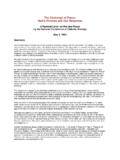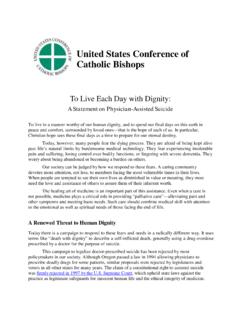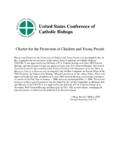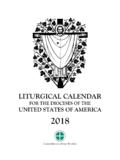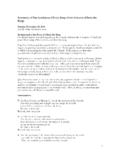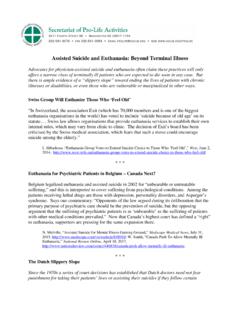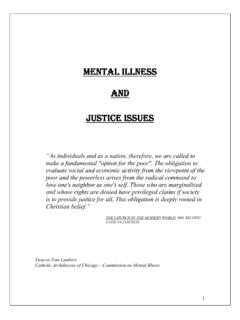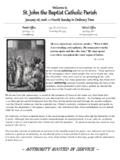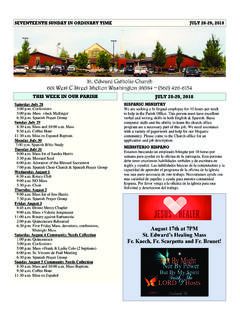Transcription of Selected Quotations from Catholic Social Thought on the ...
1 Department of Justice, Peace and Human Development 3211 4th St. NE Washington, DC 20017 (202)541-3160 The Catholic Church has a well-documented tradition on labor and unions, rooted in the human right of association. This document excerpts passages that highlight this tradition. This document is intended to serve as a primer on this issue; it is not comprehensive. To read the complete text of a cited document, simply click on the title. Emphasis is added. Selected Quotations from Catholic Social Thought on the Rights and Responsibilities of Workers and Labor Unions The Hundredth Year (Centesimus Annus) Pope John Paul II, 1991 Furthermore, society and the State must ensure wage levels adequate for the maintenance of the worker and his family, including a certain amount for savings.
2 This requires a continuous effort to improve workers' training and capability so that their work will be more skilled and productive, as well as careful controls and adequate legislative measures to block shameful forms of exploitation, especially to the disadvantage of the most vulnerable workers, of immigrants and of those on the margins of society. The role of trade unions in negotiating minimum salaries and working conditions is decisive in this area. (no. 15) Economic Justice for All Catholic Bishops, 1986 No one may deny the right to organize without attacking human dignity itself.
3 Therefore, we firmly oppose organized efforts, such as those regrettably now seen in this country, to break existing unions and prevent workers from organizing. (no. 104) Perhaps the greatest challenge facing workers and unions today is that of developing a new vision of their role in the economy of the future. The labor movement in the United States stands at a crucial moment. The dynamism of the unions that led to their rapid growth in the middle decades of this century has been replaced by a decrease in the percentage of workers who are organized.
4 American workers are under heavy pressures today that threaten their jobs.. In these difficult circumstances, guaranteeing the rights of workers calls for imaginative vision and creative new steps, not reactive or simply defensive strategies. (no. 108) continued on next page Charity in Truth (Caritas in Veritate) Pope Benedict XVI, 2009 Through the combination of Social and economic change, trade union organizations experience greater difficulty in carrying out their task of representing the interests of workers, partly because Governments, for reasons of economic utility, often limit the freedom or the negotiating capacity of labour unions.
5 The repeated calls issued within the Church's Social doctrine, beginning with Rerum Novarum, for the promotion of workers' associations that can defend their rights must therefore be honoured today even more than in the past, as a prompt and far-sighted response to the urgent need for new forms of cooperation at the international level, as well as the local level. (no. 25) The global context in which work takes place also demands that national labour unions, which tend to limit themselves to defending the interests of their registered members, should turn their attention to those outside their membership, and in particular to workers in developing countries where Social rights are often violated.
6 The protection of these workers, partly achieved through appropriate initiatives aimed at their countries of origin, will enable trade unions to demonstrate the authentic ethical and cultural motivations that made it possible for them, in a different Social and labour context, to play a decisive role in development. (no. 64) Forming Consciences for Faithful Citizenship Catholic Bishops, 2007 Catholic Social teaching supports the right of workers to choose whether to organize, join a union, and bargain collectively, and to exercise these rights without reprisal.
7 Workers, owners, employers, and unions should work together to create decent jobs, build a more just economy, and advance the common good. (no. 76) Department of Justice.
8 Peace and Human Development 3211 4th St. NE Washington, DC 20017 (202)541-3160 On the Condition of Labor (Rerum Novarum) Pope Leo XIII, 1891 The most important of all [workplace associations and organizations] are workingmen's unions.. Such unions should be suited to the requirements of this our age - an age of wider education, of different habits, and of far more numerous requirements in daily life. It is gratifying to know that there are actually in existence not a few associations of this nature, consisting either of workmen alone, or of workmen and employers together, but it were greatly to be desired that they should become more numerous and more efficient.
9 (no. 49) We read in the pages of holy Writ: "It is better that two should be together than one; for they have the advantage of their society. If one fall he shall be supported by the other. Woe to him that is alone, for when he falleth he hath none to lift him up." And further: "A brother that is helped by his brother is like a strong city." It is this natural impulse which binds men together in civil society; and it is likewise this which leads them to join together in associations.. Private societies, then, although they exist within the body politic, and are severally part of the commonwealth, cannot nevertheless be absolutely, and as such, prohibited by public authority.
10 For, to enter into a "society" of this kind is the natural right of man; and the State has for its office to protect natural rights, not to destroy them; and, if it forbid its citizens to form associations, it contradicts the very principle of its own existence, for both they and it exist in virtue of the like principle, namely, the natural tendency of man to dwell in society. (nos. 50-51) On Human Work (Laborem Exercens) Pope John Paul II, 1981 All these rights [of workers], together with the need for the workers themselves to secure them, give rise to yet another right: the right of association, that is to form associations for the purpose of defending the vital interests of those employed in the various professions.
